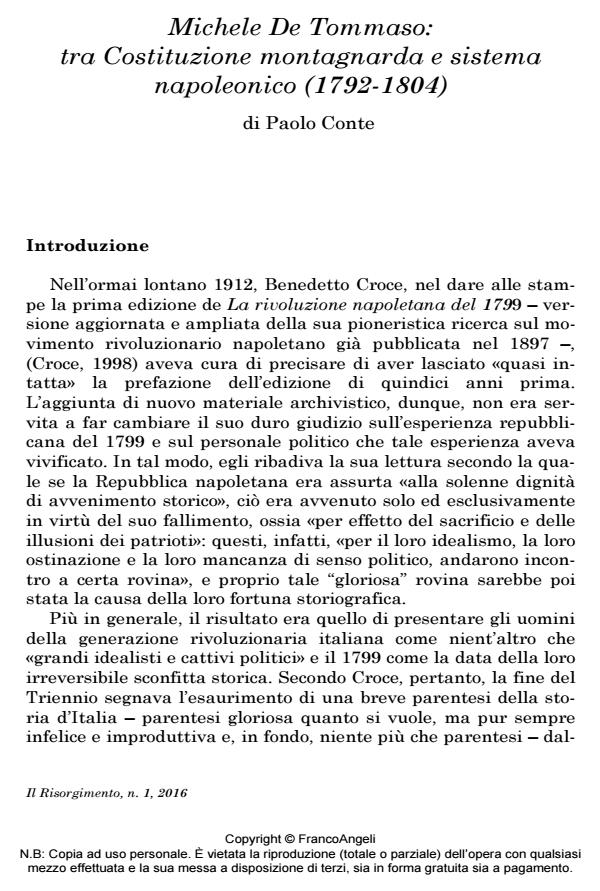Michele De Tommaso: between Montagnard Constitution and Napoleonic system (1793-1804).
Journal title RISORGIMENTO (IL)
Author/s Paolo Conte
Publishing Year 2016 Issue 2016/1
Language Italian Pages 34 P. 21-54 File size 254 KB
DOI 10.3280/RISO2016-001002
DOI is like a bar code for intellectual property: to have more infomation
click here
Below, you can see the article first page
If you want to buy this article in PDF format, you can do it, following the instructions to buy download credits

FrancoAngeli is member of Publishers International Linking Association, Inc (PILA), a not-for-profit association which run the CrossRef service enabling links to and from online scholarly content.
Per i patrioti italiani che avevano sostenuto la causa della Rivoluzione francese, il passaggio all’"ordine napoleonico" seguito alla vittoria repubblicana di Marengo non comporto la fine della loro attivita politica. Ne e un esempio il percorso biografico di Michele De Tommaso, prete napoletano attivo nell’organizzazione dei club patriottici partenopei ancor prima del 1796 e poi distintosi fra il Ponente ligure e Napoli nell’intensa fase del Triennio giacobino. Dopo il crollo delle Repubbliche sorelle, terminato un breve periodo di esilio in Francia, fece ritorno a Porto Maurizio, dove durante la "seconda" Repubblica ligure si distinse sia per la sua attivita intellettuale e pedagogica, sia per il suo attivismo filofrancese. Da un lato fondo e diresse una scuola pubblica di filosofia e scrisse opere di logica e metafisica, dall’altro svolse il ruolo di cancelliere del Viceconsolato transalpino e fu arrestato due volte per la partecipazione a rivolte cittadine: modalita diverse, ma complementari, per portar avanti la battaglia politica per la democrazia in Italia.
The transition to the "Napoleonic order" that followed the republican victory of Marengo did not entail the end of political activity for the Italian patriots who supported the cause of the French Revolution. An example is found by the biographical path of Michele De Tommaso, a Neapolitan priest active in the organization of the Neapolitan patriotic associations even before 1796, who distinguished himself during the intense period known as the Jacobin Triennium, in Western Liguria and Naples. After the collapse of the "Sister Republics" he endured a brief exile in France before returning to Porto Maurizio where, during the "second" Ligurian Republic, he became prominent for his intellectual and pedagogical activity as well as for his pro-French activism. He founded and headed an open school of philosophy, he occupied the position of chancellor at the trans-alpine Vice-consulate, and was arrested twice for taking part in municipal revolts. All the above were different, but complementary ways of action to continue the political battle for democracy in Italy.
Keywords: Italian Jacobin generation, French Revolution, Ligurian Republic
Paolo Conte, Michele De Tommaso: tra Costituzione montagnarda e sistema napoleonico (1792-1804) in "RISORGIMENTO (IL)" 1/2016, pp 21-54, DOI: 10.3280/RISO2016-001002